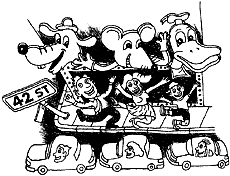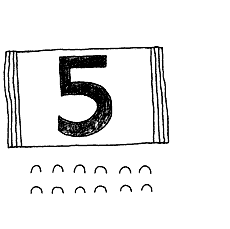
Architecture
New Amsterdam Theater (New York City). For months, critics have derided Disney's plans to clean up Times Square as mere Disneyfication. But they are more sanguine when it comes to the restoration of the 1903 New Amsterdam Theater. It is now "one of the grandest and most mind-bendingly ornate theaters in America, an eclectic melange of Art Nouveau and other turn-of-the-century ornamentation and a triumph of the restorer's art," says Time's Bruce Handy. Not all skepticism has been banished, however. "This street has the potential to become one of the most culturally important in urban America. ... Or it could simply be a bright but chuckleheaded exercise in consumerism" (Herbert Muschamp, the New York Times). (To learn more about the New Amsterdam, click here.)
Event
Cannes International Film Festival (France). Predictably, the film festival's 50th anniversary is an overhyped bash; and predictably, critics kvetch. "[T]he supposed guests of honor--the films--are in danger of being relegated to a secondary role as the free-wheeling fest becomes the real star of the show," says Variety's Michael Williams. Complaints: 1) There are too many American stars; 2) Sylvester Stallone continues to try to win acceptance as a serious actor; 3) the movies stink. Only two have received acclaim: Welcome to Sarajevo, starring Woody Harrelson and Marisa Tomei as journalists who save Bosnian orphans; and Ang Lee's adaptation of Rick Moody's The Ice Storm. Flops include The Brave, Johnny Depp's directorial debut. (See Cannes' surprisingly subdued official site for more on the festivities.)
Movies
Father's Day (Warner Brothers). Despite performances by certified funny people Robin Williams and Billy Crystal (each plays a man convinced he is the real father of Nastassja Kinski's son), most critics say, this remake of the 1983 French comedy Les Compères is unfunny. Williams and Crystal "do the old married couple shtick so well they should open a joint bank account" (John Anderson, Newsday). But the script is heavier on sentimental musing on parenthood than it is on humor. "[T]hese two great comics are poorly served by the picture's ... domestic respectability. Family values are fine, in their place, but this is the wrong place" (Terrence Rafferty, The New Yorker). The New York Times' Janet Maslin, however, dissents: "[T]here are some slow patches and formulaic touches, but that's a fair trade for the fun of watching Mr. Williams and Mr. Crystal make an irresistible comic team." (See the Father's Day site.)

The Fifth Element (Columbia Pictures). The high-kitsch sci-fi blockbuster, set in 23rd century New York and directed by French schlockmeister Luc Besson (La Femme Nikita), augurs not only the end of the world but, critics predict, the end of culture. "[T]he annihilation of everything Cannes has stood for" (Owen Gleiberman, Entertainment Weekly). "A spectacular triumph of style over substance," says the Washington Post's Rita Kempley. Kudos go to its cartoonish set and the elaborate costumes by Jean-Paul Gaultier. The plot, in which Bruce Willis and scantily clad model Milla Jovovich save the planet, is ridiculed as even more implausible than usual. "How can filmmakers devote a year, even two years of their lives to such overwrought, crumbling nonsense?" (David Denby, New York). (See David Edelstein's similarly negative review. Visit The Fifth Element site.)
The Designated Mourner (First Look Pictures). Raves for this adaptation of a play by actor/writer Wallace Shawn (My Dinner With Andre), which features three intellectuals holding forth on the decay of high culture ("like a surreal extended edition of The Charlie Rose Show," writes Stephen Holden in the New York Times). The script "flows along seamlessly ... [and] has a measured elegance," says Holden. Praise also goes to comedian Mike Nichols' film-acting debut: His "timing is flawless, his speech peppered with strange pauses through which we grasp the full weight of his irony, derision, and sheer incredulity at the peculiarity of the human phenomena that surround him" (Leslie Camhi, the Village Voice). (Slate's Sarah Kerr argues that the movie is merely pretentious.)
Television
The Odyssey (NBC, May 18 and 19; 9 p.m. EDT/PDT). Critics trash Homer's epic-turned-sweeps-month-stunt. With a $43 million budget, it is, minute for minute, the most expensive TV show ever, and also features a shocking amount of sex--as Odysseus, Armand Assante sleeps with Penelope (Greta Scacchi), Circe (Bernadette Peters), and Calypso (Vanessa Williams). Time's Ginia Bellafante says the show "seesaws--often uncomfortably--between earnestness and camp." This Odysseus "seems to be on a very long journey to find his missing Prozac." (Watch previews and join The Odyssey chat on NBC's site.)
Books
The Courage to Stand Alone: Letters From Prison and Other Writings, by Wei Jingsheng, translated and edited by Kristina M. Torgeson (Viking). Writings by the imprisoned Chinese political activist are granted a place "among the classics of the 20th century literature of dissent, alongside the writings of figures like Vaclav Havel, Vladmir Bukovsky and Adam Michnik" (Richard Bernstein, the New York Times). The collection mainly consists of letters, written from prison to Chinese leaders, pleading the case for democracy. "[D]espite the impossible circumstances under which they were written, they are an extraordinary and moving record of a courageous, compassionate and obstinate mind dedicated to democratic principles and the amelioration of the Chinese people's harsh fate" (Judith Shapiro, the New York Times Book Review).
The Time Bind: When Work Becomes Home and Home Becomes Work, by Arlie Russell Hochschild (Metropolitan Books/Henry Holt & Co.). Mostly positive reviews for the Berkeley sociologist's latest work, in which she argues that parents put in ever longer hours at work not because they must but because they prefer it to home. In the New York Times Book Review, Nicholas Lemann praises the book: "Ms. Hochschild writes in a calm, understanding tone that tends to disguise how truly subversive and depressing her message is." Slate's Ann Hulbert says Hochschild overstates her case: "The truth is that home hasn't suddenly become work. It has always been work--endless work."
Theater
Candide (Gershwin Theatre, New York City). Another extravagant musical, more unkind reviews. For the third time in 25 years, director Harold Prince revives the 1956 Leonard Bernstein-Lillian Hellman-Richard Wilbur version of Voltaire's novel. The problem with this production: Prince sets Candide in a traveling carnival and includes elaborate stunts like artificial flying falcons, thereby substituting "spectacle ... for satire ... without an iota of anarchy or inspiration," says The New Yorker's John Lahr. The New York Times' Ben Brantley says that "Candide is truly one of the best of all possible musicals, but only if you close your eyes."
Museum
Newseum (Arlington, Va.). Gannett's effort at self-aggrandizing philanthropy is dismissed as self-aggrandizing propaganda. Located across the street from USA Today's headquarters, the Newseum's collection consists partly of artifacts from great moments in journalism (e.g., Edward R. Murrow's microphone) and partly of high-tech interactive games meant to depict the workings of a newspaper (the Daily Miracle). "You get more feeling for the newspaper business from Daily Planet panels in an old Superman comic" (Henry Allen, the Washington Post). Time's Andrew Ferguson says the museum "is a $50 million testament to the terrifying insecurity that lurks at the heart of American journalism." (See the Newseum site.)
Updates
In The New Yorker, Louis Menand praises Philip Roth's American Pastoral. It is about "the same irony and the same agony" as Portnoy's Complaint--the excesses of the 1960s--but American Pastoral is "darker, difficult, more mature."... The Weekly Standard's Pia Catton argues that the FDR monument "misrepresents and diminishes the man" because it lacks the grandeur of the Jefferson, Lincoln, and Washington monuments. It "is as accessible and gentle as your grandmother's garden."
Recent "Summary Judgment" columns
Book--Mason & Dixon, by Thomas Pynchon;
Book/Television--American Visions: The Epic History of Art in America, by Robert Hughes, and American Visions (PBS);
Book--Echo House, by Ward Just;
Book--Reading in the Dark, by Seamus Deane;
Architecture--Franklin Delano Roosevelt Memorial;
Television--The Last Don (CBS);
Movie--Children of the Revolution;
Movie--Breakdown.
Movie--Volcano;
Movie--Romy and Michele's High School Reunion;
Pop--Share My World, by Mary J. Blige;
Book--Locked in the Cabinet, by Robert Reich;
Book--Anything Your Little Heart Desires: An American Family Story, by Patricia Bosworth;
Book--Hystories: Hysterical Epidemics and Modern Media, by Elaine Showalter;
Theater--Titanic;
Theater--The Little Foxes;
Dance--"In Honor of the Divine Lou Harrison," the Mark Morris Dance Group.
Book--The Gospel According to the Son, by Norman Mailer;
Book--American Pastoral, by Philip Roth;
Book--W.B. Yeats: A Life. 1: The Apprentice Mage, 1865-1914, by R.F. Foster;
Book--Purple America, by Rick Moody;
Television--In the Gloaming;
Opera--The Ring of the Nibelung;
Movie--Murder at 1600;
Movie--Kissed.
Art--"Picasso: The Early Years, 1892-1906" (National Gallery of Art, Washington, D.C.);
Movie--Anaconda;
Movie--Grosse Pointe Blank;
Theater--An American Daughter;
Book--Naked, by David Sedaris;
Book--The Blue Flower, by Penelope Fitzgerald;
Book--Gut Symmetries, by Jeanette Winterson;
Book--Inventions of the March Hare: Poems 1909-1917, by T.S. Eliot, edited by Christopher Ricks.
--Compiled by Franklin Foer and the editors of Slate.
